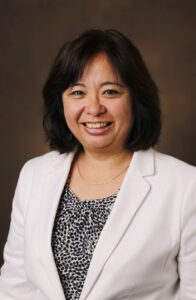 In January, Cecilia Pilar Chung, MD, MPH, began her new appointment as director of the Division of Rheumatology at the University of Miami. Previously, Dr. Chung was an associate professor of medicine at Vanderbilt University, Nashville, Tenn., for more than 10 years.
In January, Cecilia Pilar Chung, MD, MPH, began her new appointment as director of the Division of Rheumatology at the University of Miami. Previously, Dr. Chung was an associate professor of medicine at Vanderbilt University, Nashville, Tenn., for more than 10 years.
At Vanderbilt, Dr. Chung built a strong research portfolio, focusing on the comparative safety of pharmaceutical agents, and the pharmacogenetics of immunosuppressant agents. Her clinical research has focused on novel cardiovascular risk factors in patients with systemic lupus erythematosus (SLE) and rheumatoid arthritis. She is the 2022 recipient of the ACR Henry Kunkel Early Career Investigator Award, and the 2022 recipient of the Leon Goldberg Early Investigator Award from the American Society for Clinical Pharmacology and Therapeutics.
We spoke with Dr. Chung in December 2022.
When she was presented with the opportunity to visit Miami, Dr. Chung had already been thinking about how she wanted to further develop as a researcher, clinician and contributor to academic medicine.
Born and raised in Peru, Dr. Chung says one of the primary attractions of her new position was the possibility to serve patients from Hispanic backgrounds. During her initial visit to Miami, she performed rounds with the rheumatology fellows. Two of the three patients they met spoke Spanish, and one was from her home country.
Goal 1: Pediatric Cardiology
Dr. Chung notes that she is the first physician in her family, recalling that she was attracted to medicine at a very young age. “I started saying I wanted to be a doctor when I was a child,” she says. In Peru, medical school begins right after high school, so Dr. Chung was only 16 years old when she began her eight-year course of study to become a physician. She obtained her medical degree from the Universidad Nacional in Lima in 1998, completing her internship the same year. The next step was a fellowship in rheumatology at the same institution.

Dr. Chung
Dr. Chung’s original goal in medicine was to become a pediatric cardiologist. However, a combination of “great clinicians and patients with very complex diseases” gave her an appreciation of how interesting and challenging a career in rheumatology could be. She distinctly recalls encountering three patients during her rheumatology rotation—two with systemic lupus erythematosus and one with polymyositis—who were quite ill but who did well after discharge from the hospital.
Maria Segami-Salazar, MD, and Manuel F. Ugarte-Gil, MD, MSc, professors, were powerful models for how to provide compassionate care, and they also demonstrated a love of teaching, she says. Dr. Chung’s first research project, examining the relationship between low-dose prednisone and bone mineral density in patients with rheumatoid arthritis, was written under the mentorship of these two Peruvian rheumatologists.


